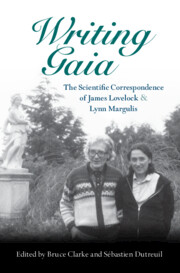Book contents
- Writing Gaia: The Scientific Correspondence of James Lovelock and Lynn Margulis
- Reviews
- Writing Gaia: The Scientific Correspondence of James Lovelock and Lynn Margulis
- Copyright page
- Epigraph
- Table of Contents
- Figures
- Contributors
- Foreword by James Lovelock
- Preface
- Acknowledgements
- Introduction
- Part I 1970–1972
- Part II 1973–1979
- Part III 1980–1991
- Part IV 1992–2007
- 1992
- 1993
- 1994
- 1995
- 1996
- 1997
- 1998
- 1999
- 2000
- 2001
- 2002
- 2003
- 2004
- 2006
- 2007
- Part V Commentaries on Lovelock and Margulis
- Glossary of Names
- Glossary of Terms
- Bibliography
- Index
1993
from Part IV - 1992–2007
Published online by Cambridge University Press: 28 July 2022
- Writing Gaia: The Scientific Correspondence of James Lovelock and Lynn Margulis
- Reviews
- Writing Gaia: The Scientific Correspondence of James Lovelock and Lynn Margulis
- Copyright page
- Epigraph
- Table of Contents
- Figures
- Contributors
- Foreword by James Lovelock
- Preface
- Acknowledgements
- Introduction
- Part I 1970–1972
- Part II 1973–1979
- Part III 1980–1991
- Part IV 1992–2007
- 1992
- 1993
- 1994
- 1995
- 1996
- 1997
- 1998
- 1999
- 2000
- 2001
- 2002
- 2003
- 2004
- 2006
- 2007
- Part V Commentaries on Lovelock and Margulis
- Glossary of Names
- Glossary of Terms
- Bibliography
- Index
Summary
In 1993, against Margulis’s residually biocentric orientation, Lovelock affirmed the need to conceive of Gaia in a way that gives the geosphere and the biosphere equal importance while also overriding their conceptual separation: “I think it best to look on Gaia as a coupled system involving both the biota and the material world. Something that cannot usefully be separated into parts” (Letter 227). It is ironic, then, that during this same period Margulis was almost completely unsuccessful in persuading Lovelock to join her in a line of enquiry that did precisely that. She gave it the name “Water Gaia.” As we noted in the preface, in 1990 she informed Lovelock, “Our first job is to rename the planet” (Letter 202). Her immediate meaning was that this planet in its Gaian specificity should be called Water instead of Earth. This is because the water that has been necessary for all life on Earth for all time is in no way an eternal fixture of the planet but, quite plausibly, a condition of habitability that Gaia itself has preserved since its inception. In any event, that is the theory that Margulis repeatedly asked Lovelock to pursue with her: “is water retention itself a Gaian phenomenon?” (Letter 202). She posed this issue again in Letters 208 and 210, without any immediate response from Lovelock that we have found. In 1995, this time in the context of soliciting his preference with regard to the topic she should present at the 1996 Gaia in Oxford gathering, she rehearsed some corollary implications of the Water Gaia thesis: “Would the rain cycle be sustained on a lifeless planet? I recently saw a Science News item entitled ‘No Ocean, No Motion’ arguing that oceans are necessary for plate tectonics” (Letter 248).
- Type
- Chapter
- Information
- Publisher: Cambridge University PressPrint publication year: 2022



